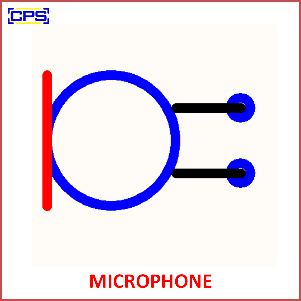A microphone is an electronic device that converts sound waves (acoustic energy) into electrical signals. It functions as a transducer, capturing sound from the environment and converting it into an electrical representation for recording, transmission, or amplification.

Key Features of a Microphone:
- Sound-to-Electric Conversion:
- Microphones transform sound waves into an electrical signal by detecting changes in air pressure created by sound.
- Types of Microphones:
- Microphones vary based on their technology and intended use, with common types including dynamic, condenser, ribbon, and electret microphones.
- Directional Sensitivity:
- Microphones can be omnidirectional (picking up sound from all directions) or directional (focusing on sound from a specific direction).
Types of Microphones:
- Dynamic Microphones:
- Use a diaphragm and a coil to generate an electrical signal. They are rugged and suitable for live performances.
- Condenser Microphones:
- Use a capacitor to convert sound into an electrical signal and require external power (phantom power). They are sensitive and ideal for studio recordings.
- Ribbon Microphones:
- Use a thin ribbon of metal to capture sound. They are known for their warm sound and are often used in studio settings.
- Electret Microphones:
- A type of condenser microphone with a permanently charged element, commonly found in phones and portable devices.
Applications:
- Audio Recording: Used in studios for recording music, podcasts, and voiceovers.
- Communication: Found in telephones, hearing aids, and video conferencing systems.
- Broadcasting: Used in radio, television, and live event broadcasting.
- Public Address Systems: Used in concerts, lectures, and events for sound amplification.
- Speech Recognition: Integrated into devices for voice-controlled systems and digital assistants.
Advantages:
- Enables accurate sound capture for various applications.
- Available in multiple designs for specific use cases.
- Versatile and compatible with numerous audio systems.
Disadvantages:
- Can pick up unwanted noise if not properly configured.
- Some types (e.g., condenser microphones) are delicate and require careful handling.
In summary, a microphone is an essential device in sound technology, converting sound into electrical signals for a wide range of applications, from communication and entertainment to professional audio production.
